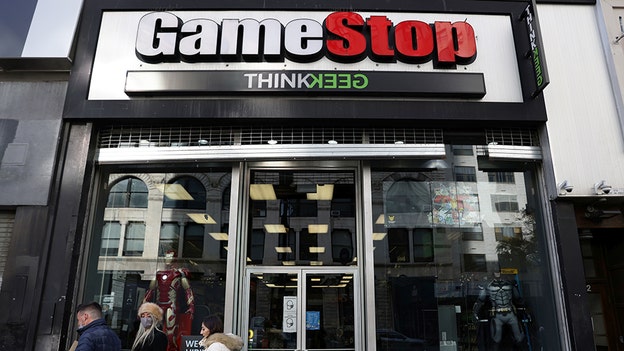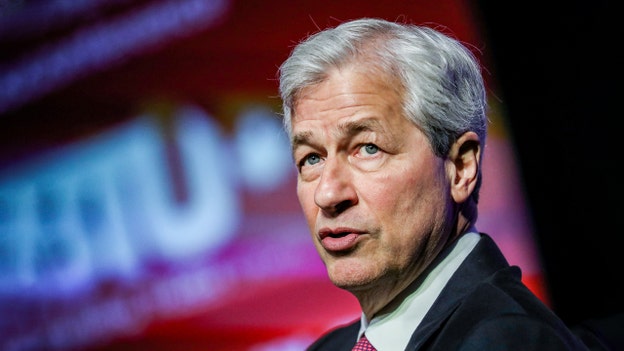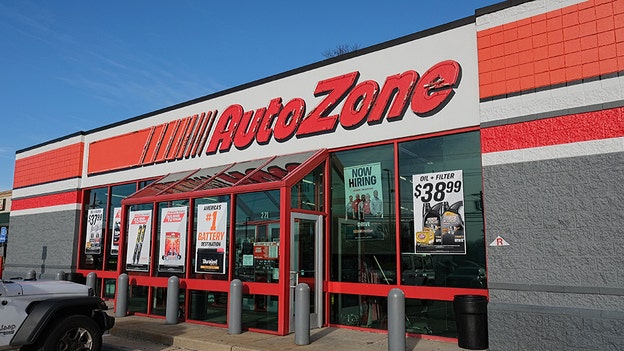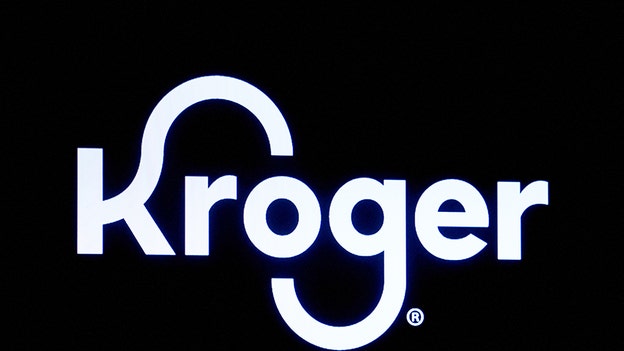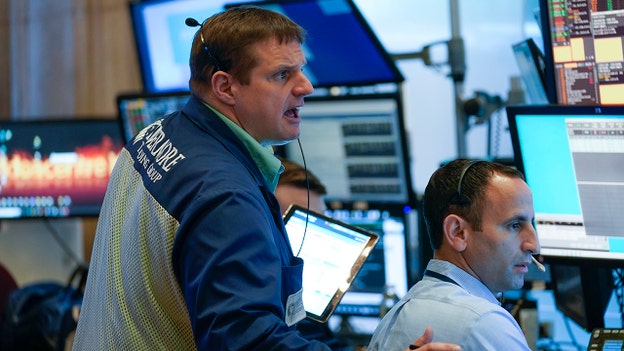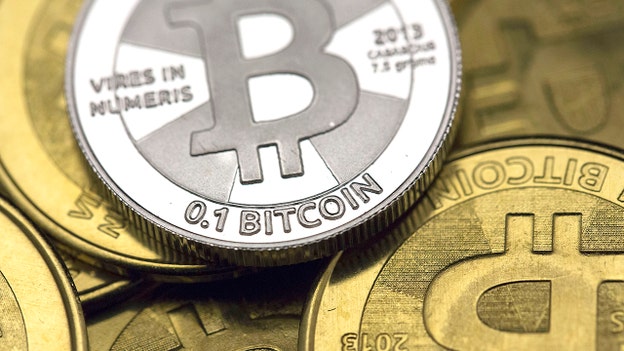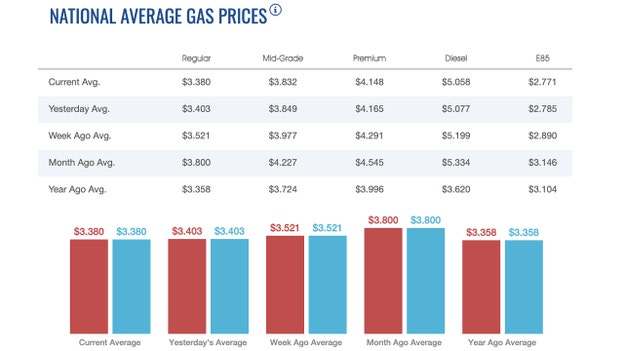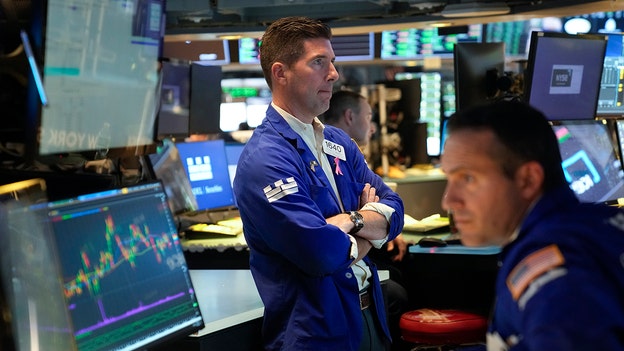Stocks, oil tumble, JPMorgan’s Dimon on recession, Apple’s Tim Cook visits Arizona chip plant
Investors remain cautious, JPMorgan CEO Jamie Dimon talks inflation, recession, Trump Organization convicted of tax fraud. FOX Business is providing real-time updates on the markets, commodities and all the most active stocks on the move.
Coverage for this event has ended.
Donald Trump’s company was convicted of tax fraud Tuesday for helping executives dodge taxes on lavish perks such as Manhattan apartments and luxury cars, in a significant repudiation of financial practices at the former president’s business.
A jury found two corporate entities at the Trump Organization guilty on all 17 counts, including conspiracy charges and falsifying business records. Trump himself was not on trial. The verdict came on the second day of deliberations.
The conviction is a validation for New York prosecutors, who have spent three years investigating the former president and his businesses.
Manhattan District Attorney Alvin Bragg said the verdict “underscores that in Manhattan we have one standard of justice for all."
As punishment, the Trump Organization could be fined up to $1.6 million — a relatively small amount for a company of its size, though the conviction might make some of its future deals more complicated.
Endo International will cease the production and sale of Endo Aesthetics’ QWO® (collagenase clostridium histolyticum-aaes) in light of market concerns about the extent and variability of bruising following initial treatment as well as the potential for prolonged skin discoloration, a regulatory filing said.
This decision is expected to result in annualized pre-tax cash savings of approximately $50 million to $60 million and a reduction to Endo’s global workforce of approximately 90 full-time positions.
In connection with ceasing production and sales of QWO®, Endo expects to incur total pre-tax restructuring charges of approximately $235 million to $250 million in the fourth quarter 2022.Collagenase clostridium histolyticum-aaes is used in the treatment of moderate to severe cellulite.
Twitter’s former Deputy General Counsel has left the company.
Jim Baker exited the social media platform following disclosures about his role in the way Twitter handled the story of Hunter Biden’s laptop.
Before joining Twitter, Baker worked as general counsel at the FBI, where he was involved in the bureau's investigation into alleged Russian interference in the 2016 presidential election.
Elizabeth Holmes wants to stay out of prison while appellate judges consider her convictions on federal fraud charges, court documents show.
Holmes’ lawyers filed a motion for release pending appeal Monday night, arguing her case satisfies the statutory requirements for the request to be granted.
They argue she is not a flight risk due to her close family ties and second pregnancy.
Holmes was sentenced last month to 11.25 years in prison.
Investors dumped stocks in a broad selloff as a chorus of Wall Street CEOs weighed in on the U.S. recession. Most of the S&P’s large sectors dropped led by technology and energy as oil slipped over 3% to $74.25 per barrel, the lowest level since December of 2021.
| Symbol | Price | Change | %Change |
|---|---|---|---|
| USO | $65.24 | -2.48 | -3.66 |
| Symbol | Price | Change | %Change |
|---|---|---|---|
| AAL | $14.21 | 0.10 | 0.67 |
| DAL | $35.67 | -0.12 | -0.34 |
| LUV | $39.64 | 0.14 | 0.35 |
| UAL | $45.62 | 0.58 | 1.30 |
United Airlines Chief Executive Scott Kirby said a tentative contract agreement between rival Delta Air Lines and its pilots union would set an industry pattern.
"It's a rich contract but I think the really good news is it means we'll all get deals done essentially on the same terms and can move forward," Kirby told Reuters on the sidelines of an event in Washington late Monday.
Delta struck a tentative deal Friday to give pilots a 34% cumulative pay increase in a new four-year contract.
Kirby says the Delta agreement will push pilot wages up across carriers and be passed onto consumers in the form of higher airplane ticket prices.
| Symbol | Price | Change | %Change |
|---|---|---|---|
| GME | $23.46 | -2.10 | -8.20 |
GameStop is reportedly laying off workers.
Axios, citing a source familiar and LinkedIn posts, said the workforce reductions hit engineers and the group building the company’s blockchain wallet.
GameStop announced last month on Twitter that it was winding down its relationship and pilot gift card marketing partnership with FTX.US and will be providing full refunds to impacted customers.
The video game retailer reports third quarter results Wednesday.
U.S. stocks took a leg down Tuesday afternoon as more recession chatter spooked investors. JPMorgan CEO Jamie Dimon became the latest to weigh in on the odds of a deeper downturn next year during a CNBC interview. In commodities, oil slipped to the $74 per barrel level.
| Symbol | Price | Change | %Change |
|---|---|---|---|
| NRG | $34.27 | -6.57 | -16.09 |
| VVNT | $11.90 | 2.91 | 32.37 |
Power company NRG Energy Inc said on Tuesday it will buy Vivint Smart Home Inc for $2.8 billion in cash, adding security and other automation products to its home service offerings.
The $12 per share deal is at a premium of 33.5% to Vivint's closing stock price on Monday. Houston, Texas-based NRG will also take on $2.4 billion of debt as part of the deal.
Vivint makes a range of home security products and hubs that help in controlling other automation gadgets, such as Amazon Echo and Google Home, through a central touchscreen panel.
Together, the companies will serve over 7.4 million customers across North America, they said in a statement.
The buyout has been unanimously approved by the boards of both the companies and is expected to close in the first quarter of next year.
Provo, Utah-based Vivint was bought by Blackstone for over $2 billion in 2012. Vivint then became publicly listed through a reverse merger with Mosaic Acquisition, a special-purpose acquisition company of SoftBank Corp.
| Symbol | Price | Change | %Change |
|---|---|---|---|
| BZFD | $1.13 | -0.01 | -0.88 |
BuzzFeed is cutting 12% of its workforce, the Internet media, news and entertainment company said.
The reduction is intended to reduce the company’s costs in response to a combination of factors, including
(i) challenging macroeconomic conditions;
(ii) completing the integration of Complex Media, Inc. d/b/a Complex Networks and eliminating redundancies where they exist in both functions and teams; and
(iii) an ongoing audience shift to short-form, vertical video, which is still developing from a monetization standpoint.
The company expects to substantially complete the workforce reduction plan by the end of the first quarter of 2023 with the foregoing charges for outplacement and benefits continuation are expected to range between $8 million to $12 million.
| Symbol | Price | Change | %Change |
|---|---|---|---|
| BNED | $1.55 | -1.00 | -39.22 |
Barnes & Noble Education misses Wall Street revenue and profit estimates.
The operator of bookstores on college campuses reported fiscal second quarter sales grew 1.6% to $617.1 million, which is lower than the estimated $675.01 million.
Net income for the 13 weeks ended Oct. 29 was $22.14 million compared to $22.53 million a year ago.
The company reported profits of 42 cents per share. Profits of 77 cents per share were anticipated by the two analysts providing estimates for the quarter.
Reuters contributed to this report.
| Symbol | Price | Change | %Change |
|---|---|---|---|
| AZO | $2,418.90 | -,108.02 | -4.27 |
AutoZone is falling in Tuesday trading despite topping Wall Street revenue and profit estimates.
Profit measures decreased. Gross margin declined due to rising freight costs. Operating profit decreased 4.2% to $723.0 million.
Inventory increased 17.6% over the same period last year, driven by inflation and growth initiatives.
The company reported fiscal first quarter profit of $27.45 per share, $1.76 higher than the same quarter last year.
Revenue for the 12 weeks ended Nov. 19 increased 8.6% to $3.99 billion, higher than the estimate of $3.86 billion.
Reuters contributed to this report.
| Symbol | Price | Change | %Change |
|---|---|---|---|
| SIG | $69.62 | 11.79 | 20.39 |
Signet Jewelers is higher in Tuesday trading. The owner of Kay Jewelers, Zales, Jared and other brands topped Wall Street revenue and profit estimates.
Total sales grew 2.9% to $1.6 billion due to unusually heightened sales, resulting in part from government benefit programs and the company's strategic transformation including marketing initiatives. The estimate was $1.5 billion.
Same store sales fell 7.6% to Q3 2022.
Net income for the quarter ended October 29 was $37.5 million compared to $92.6 million a year ago.
The company reported profits of 74 cents per share. The forecasted mean of 31 cents per share.
Reuters contributed to this report.
| Symbol | Price | Change | %Change |
|---|---|---|---|
| KR | $46.45 | 0.38 | 0.82 |
| ACI | $21.13 | 0.17 | 0.81 |
Kroger Co said on Tuesday it received a request for additional information from the U.S. Federal Trade Commission as part of the regulatory review process for its planned $25 billion merger with Albertsons Companies Inc.
The deal, which was announced in mid-October, has drawn fire from lawmakers and consumer groups amid concerns the tie-up of the No. 1 and 2 standalone grocers in the United States could boost already-high food prices and stifle competition.
The chief executives of both companies defended the merger to the U.S. Senate committee late in November, with Kroger's top boss Rodney McMullen saying that the combined company would still be much smaller than Walmart Inc.
The request from FTC extends the required waiting period until 30 days after the companies have "substantially complied" with the requests, Kroger said.The company added it still expects to complete the deal in early 2024.
| Symbol | Price | Change | %Change |
|---|---|---|---|
| ASHTY | $250.78 | 4.39 | 1.78 |
Britain's Ashtead Group Plc forecast full-year results ahead of its expectations on Tuesday and raised its interim dividend by 20%, encouraged by strong demand for rental equipment across its markets, sending its shares 4% higher.
The London-listed company, which rents out industrial and construction equipment, posted a 28% jump in adjusted pre-tax profit to $688 million in the three months ended Oct. 31.
First half revenue rose 26% to $4.8 billion at constant currency. Growth was driven by rental only revenue in the U.S., up 26% to $3.0 billion, due to volume and rate improvements.
Group rental revenue growth is now expected between 18-21%, up from previous guidance of 15-17%.
“Ashtead’s largest market, the US, is benefiting from a host of fiscal policies aimed at improving infrastructure and supply chain resilience—Ashtead’s scale and expertise should place it well to be a key supplier,” said Matt Britzman, Equity Analyst at Hargreaves Lansdown. “Inflation on a host of cost lines remains a challenge, but Ashtead has the scope to pass most of the pain onto its customers with higher rental rates on its $15bn rental fleet.”
Reuters contributed to this report.
Snack and beverage giant Pepsi is telling employees to brace for layoffs.
America's debt is climbing creating more headwinds for the U.S. economy.
U.S. stock futures are little changed on Tuesday following a sell-off during the previous trading session.
Dow Jones Industrial Average futures were up 24 points, or 0.06%, and S&P 500 and Nasdaq Composite futures climbed slightly.
The Dow finished Monday down 482 points, or 1.4%, while S&P 500 fell 1.79%. The Nasdaq Composite led the rout, closing 1.93% lower.
Over the last five days, the blue-chip Dow added 0.28%, the S&P went 1.04% higher, while the tech-heavy Nasdaq jumped 2.33%.
The U.S. Tech 100 also moved 2.46% into the green over the last five days but will begin the trading day lower as key tech stocks struggle to find gains.
On Tuesday, shares of Meta are down 0.46%, while Apple, Microsoft and Alphabet are fractionally higher.
Meanwhile, West Texas Intermediate crude futures slipped 1.14% to $76.05 a barrel, while gold clings to a 0.62% gain at $1792.30 an ounce. WTI skidded 3.9% over the last five days while gold added 2.69% during the same period.
Cryptocurrency prices were mixed early Tuesday with Bitcoin higher, but Ethereum and Dogecoin lower.
At approximately 4:45 a.m. ET, Bitcoin was trading at nearly $17,001 (+0.22%), or higher by $38.
For the week, Bitcoin was trading higher by nearly 4.60%. For the month, however, the cryptocurrency was lower by nearly 20.35%.
Ethereum was trading at approximately $1,258 (-0.15%), or lower by about $2.
For the week, Ethereum was trading higher by nearly 7.7%. For the month, it was trading lower by approximately 22.65%.
Dogecoin was trading at $0.10082 (-0.90%), or lower by approximately $0.00091.
For the week, Dogecoin was higher by almost 7%. For the month, the crypto was lower by lower by nearly 18.75%.
The nationwide price for a gallon of gasoline slipped Tuesday to $3.38. On Monday, the price stood at $3.403. On Sunday, the price stood at $3.413, according to AAA.
One week ago, a gallon of gasoline cost $3.521. A month ago, that same gallon of gasoline cost $3.80. A year ago, a gallon of gasoline cost $3.358.
Gas hit an all-time high of $5.016 on June 14.
Meanwhile, on Tuesday a gallon of diesel cost $5.058. On Monday, the price stood at $5.077. It declined to $5.095 on Sunday.
One week ago, a gallon of diesel cost $5.199. A month ago, that same gallon of diesel cost $5.334 A year ago, a gallon of diesel cost $3.62.
| Symbol | Price | Change | %Change |
|---|---|---|---|
| I:DJI | $33,947.10 | -,482.78 | -1.40 |
| SP500 | $3,998.84 | -72.86 | -1.79 |
| I:COMP | $11,239.94 | -,221.56 | -1.93 |
U.S. stocks were whipsawing early Tuesday morning after spending most of the overnight hours lower.
Investors are keeping a wary eye on the Fed, hoping it might slow the pace of interest rate hikes aimed at curbing stubbornly high inflation.
The services sector, which makes up the biggest part of the U.S. economy, showed surprising growth in November, the Institute for Supply Management reported Monday.
Business orders at U.S. factories and orders for durable goods in October also rose more than expected. That news is positive for the broader economy, but it complicates the Fed’s fight against inflation because it likely means the central bank will have to keep raising interest rates to bring down price pressures.
The Fed is meeting next week and is expected to raise interest rates by a half-percentage point, which would mark an easing of sorts from a steady stream of three-quarters of a percentage point rate increases.
The central bank has raised its benchmark rate six times since March, driving it to a range of 3.75% to 4%, the highest in 15 years. Wall Street expects the benchmark rate to reach a peak range of 5% to 5.25% by the middle of 2023.
The aim is to cool growth without slamming on the brakes and causing a recession that would cascade through the global economy, slowing trade and consumer spending .
The S&P 500 fell 1.8% Monday to 3,998.84. The Dow Jones Industrial Average lost 1.4% to 33,947.10 and the tech-heavy Nasdaq gave back 1.9%, closing at 11,239.94. S
mall-company stocks fell even more, sending the Russell 2000 index 2.8% lower to 1,840.22.
Wall Street will get a weekly update on unemployment claims Thursday, while November's monthly report on producer prices is due Friday.
Meanwhile, stocks were mostly lower in Asia on Tuesday after Wall Street pulled back as surprisingly strong economic reports highlighted the difficulty of the Federal Reserve’s fight against inflation.
Tokyo rose, Shanghai was flat and other regional markets declined. U.S. futures gained and oil prices also advanced.In Asian trading, Hong Kong’s Hang Seng fell 0.7% to 19,367.84 and the Kospi in South Korea fell 1.1% to 2,393.16. The Shanghai Composite index was flat at 3,212.53. Tokyo’s Nikkei 225 index closed 0.2% higher at 27,885.87. Shares also fell in Bangkok and Taiwan.
| Symbol | Price | Change | %Change |
|---|---|---|---|
| USO | $67.72 | -2.12 | -3.04 |
| CVX | $176.56 | -4.47 | -2.47 |
| XOM | $106.85 | -3.01 | -2.74 |
Oil rebounded on Tuesday after plunging by more than 3% in the previous session, as the implementation of sanctions on Russian seaborne crude oil eased concerns about oversupply while the relaxing of China's COVID curbs bolstered the demand outlook.
Brent crude futures had gained 85 cents to $83.53 a barrel by 0733 GMT. West Texas Intermediate crude (WTI) rose 68 cents to $77.62 a barrel.
Crude futures on Monday recorded their biggest daily drop in two weeks, after U.S. service sector data raised worries that the Federal Reserve could continue its aggressive policy tightening path.
The Group of 7 set a top price of $60 a barrel on Russian crude, aiming to limit Moscow's ability to finance its war in Ukraine, but Russia has said it will not abide by the measure even if it has to cut production.
The price cap, to be enforced by the G7 nations, the European Union and Australia, comes on top of the EU's embargo on imports of Russian crude by sea and similar pledges by the United States, Canada, Japan and Britain.
While the market weighs the impact of sanctions on Russian supply, it was also watching a traffic jam of oil tankers off the coast of Turkey on Monday, with Ankara insisting on new proof of insurance for all vessels.
"The threat of losing protection and indemnity (P&I) insurance will limit Russia's access to the tanker market, reducing crude exports to 2.4 million barrels per day (bpd) – 500,000 bpd lower than levels seen before Russia invaded Ukraine in late February this year," said analysts from Rystad Energy in a note.
In China, more cities are easing COVID-19-related curbs, prompting optimism for increased demand in the world's top oil importer. The country is set to announce a further relaxation of some of the world's toughest COVID curbs as early as Wednesday, sources said.
Live Coverage begins here






